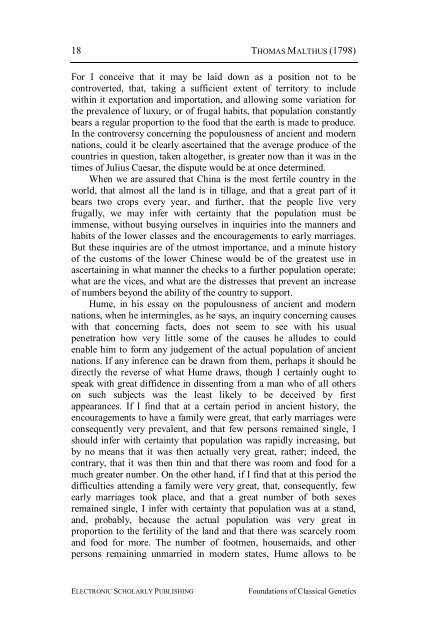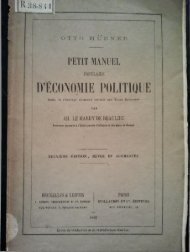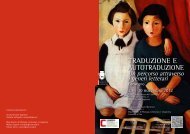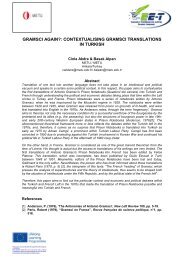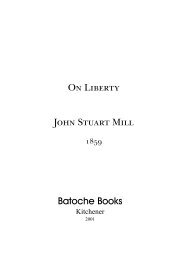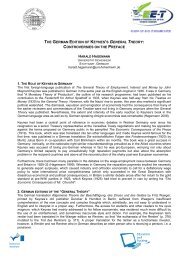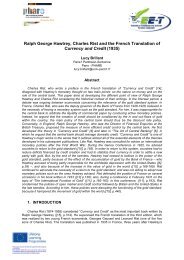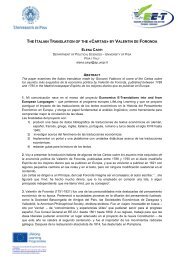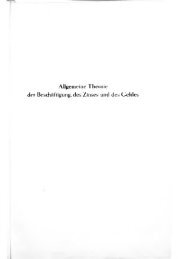Malthus, Thomas, Robert, An Essay on the Principle of Population ...
Malthus, Thomas, Robert, An Essay on the Principle of Population ...
Malthus, Thomas, Robert, An Essay on the Principle of Population ...
You also want an ePaper? Increase the reach of your titles
YUMPU automatically turns print PDFs into web optimized ePapers that Google loves.
18 THOMAS MALTHUS (1798)<br />
For I c<strong>on</strong>ceive that it may be laid down as a positi<strong>on</strong> not to be<br />
c<strong>on</strong>troverted, that, taking a sufficient extent <strong>of</strong> territory to include<br />
within it exportati<strong>on</strong> and importati<strong>on</strong>, and allowing some variati<strong>on</strong> for<br />
<strong>the</strong> prevalence <strong>of</strong> luxury, or <strong>of</strong> frugal habits, that populati<strong>on</strong> c<strong>on</strong>stantly<br />
bears a regular proporti<strong>on</strong> to <strong>the</strong> food that <strong>the</strong> earth is made to produce.<br />
In <strong>the</strong> c<strong>on</strong>troversy c<strong>on</strong>cerning <strong>the</strong> populousness <strong>of</strong> ancient and modern<br />
nati<strong>on</strong>s, could it be clearly ascertained that <strong>the</strong> average produce <strong>of</strong> <strong>the</strong><br />
countries in questi<strong>on</strong>, taken altoge<strong>the</strong>r, is greater now than it was in <strong>the</strong><br />
times <strong>of</strong> Julius Caesar, <strong>the</strong> dispute would be at <strong>on</strong>ce determined.<br />
When we are assured that China is <strong>the</strong> most fertile country in <strong>the</strong><br />
world, that almost all <strong>the</strong> land is in tillage, and that a great part <strong>of</strong> it<br />
bears two crops every year, and fur<strong>the</strong>r, that <strong>the</strong> people live very<br />
frugally, we may infer with certainty that <strong>the</strong> populati<strong>on</strong> must be<br />
immense, without busying ourselves in inquiries into <strong>the</strong> manners and<br />
habits <strong>of</strong> <strong>the</strong> lower classes and <strong>the</strong> encouragements to early marriages.<br />
But <strong>the</strong>se inquiries are <strong>of</strong> <strong>the</strong> utmost importance, and a minute history<br />
<strong>of</strong> <strong>the</strong> customs <strong>of</strong> <strong>the</strong> lower Chinese would be <strong>of</strong> <strong>the</strong> greatest use in<br />
ascertaining in what manner <strong>the</strong> checks to a fur<strong>the</strong>r populati<strong>on</strong> operate;<br />
what are <strong>the</strong> vices, and what are <strong>the</strong> distresses that prevent an increase<br />
<strong>of</strong> numbers bey<strong>on</strong>d <strong>the</strong> ability <strong>of</strong> <strong>the</strong> country to support.<br />
Hume, in his essay <strong>on</strong> <strong>the</strong> populousness <strong>of</strong> ancient and modern<br />
nati<strong>on</strong>s, when he intermingles, as he says, an inquiry c<strong>on</strong>cerning causes<br />
with that c<strong>on</strong>cerning facts, does not seem to see with his usual<br />
penetrati<strong>on</strong> how very little some <strong>of</strong> <strong>the</strong> causes he alludes to could<br />
enable him to form any judgement <strong>of</strong> <strong>the</strong> actual populati<strong>on</strong> <strong>of</strong> ancient<br />
nati<strong>on</strong>s. If any inference can be drawn from <strong>the</strong>m, perhaps it should be<br />
directly <strong>the</strong> reverse <strong>of</strong> what Hume draws, though I certainly ought to<br />
speak with great diffidence in dissenting from a man who <strong>of</strong> all o<strong>the</strong>rs<br />
<strong>on</strong> such subjects was <strong>the</strong> least likely to be deceived by first<br />
appearances. If I find that at a certain period in ancient history, <strong>the</strong><br />
encouragements to have a family were great, that early marriages were<br />
c<strong>on</strong>sequently very prevalent, and that few pers<strong>on</strong>s remained single, I<br />
should infer with certainty that populati<strong>on</strong> was rapidly increasing, but<br />
by no means that it was <strong>the</strong>n actually very great, ra<strong>the</strong>r; indeed, <strong>the</strong><br />
c<strong>on</strong>trary, that it was <strong>the</strong>n thin and that <strong>the</strong>re was room and food for a<br />
much greater number. On <strong>the</strong> o<strong>the</strong>r hand, if I find that at this period <strong>the</strong><br />
difficulties attending a family were very great, that, c<strong>on</strong>sequently, few<br />
early marriages took place, and that a great number <strong>of</strong> both sexes<br />
remained single, I infer with certainty that populati<strong>on</strong> was at a stand,<br />
and, probably, because <strong>the</strong> actual populati<strong>on</strong> was very great in<br />
proporti<strong>on</strong> to <strong>the</strong> fertility <strong>of</strong> <strong>the</strong> land and that <strong>the</strong>re was scarcely room<br />
and food for more. The number <strong>of</strong> footmen, housemaids, and o<strong>the</strong>r<br />
pers<strong>on</strong>s remaining unmarried in modern states, Hume allows to be<br />
ELECTRONIC SCHOLARLY PUBLISHING<br />
Foundati<strong>on</strong>s <strong>of</strong> Classical Genetics


